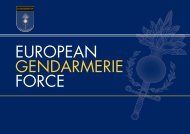Conference
science-research-bulletin-2013-conference
science-research-bulletin-2013-conference
Create successful ePaper yourself
Turn your PDF publications into a flip-book with our unique Google optimized e-Paper software.
EUROPEAN POLICE SCIENCE AND RESEARCH BULLETIN<br />
SPECIAL CONFERENCE EDITION<br />
empirical work undertaken by PAJ Waddington<br />
(1994, 1998), someone not customarily critical<br />
of the police. Waddington’s two-year participant<br />
observation study of public order policing in the<br />
MPS demonstrated the means by which senior<br />
officers were able successfully to achieve their<br />
objectives by using pre-event negotiation to<br />
ensure that protesters march peacefully along<br />
the police’s preferred route while causing a<br />
minimum of disruption and inconvenience to<br />
ongoing city life. In short, ‘Negotiation was<br />
less a process of “give and take” and more that<br />
of the organiser giving and the police taking. The<br />
police were enormously successful at ensuring that<br />
protest took place on their terms’ (Waddington,<br />
1994, p. 101).<br />
Outcomes of this type were invariably secured<br />
via the police usage of a range of communicative<br />
‘ploys’ in the build-up to the protest, such as<br />
displays of spurious friendship towards organisers,<br />
donating helpful guidance and advice, or<br />
extending apparently unconditional favours.<br />
‘Thus, negotiations are conducted with the<br />
amicability and good humor [sic] that would<br />
seem more appropriate to arranging a loan from<br />
a bank…Such amicability is not the product of<br />
genuine liking for or agreement with the organisers,<br />
the campaigns they represent, or their cause. It is a<br />
studied performance designed to dispel any tension,<br />
hostility or antagonism that the organiser might<br />
harbor [sic]. Once negotiation begins, the police<br />
stance is one of proffering help and advice — "How<br />
can we help you?" — "help you," that is, to "do it<br />
our way." Many organisers are inexperienced and so<br />
the police "organise it for them." They recommend<br />
routes along which to march, provide the telephone<br />
numbers of officials in other organisations that need<br />
to be contacted, and suggest how difficulties might<br />
be resolved’. (Waddington, 1998: 120-1)<br />
The police know that contact and benevolence<br />
of this nature implicitly commits the organisers<br />
both to upholding an exchange relationship<br />
and assuming a position of mutual responsibility<br />
for potential problems that might occur<br />
(Waddington, 1994, p. 84). Police and organisers<br />
thus have a shared interest in the outcome of the<br />
demonstration — hence, the greater propensity<br />
for relevant information and intelligence to be<br />
reciprocated, especially in relation to groups or<br />
individuals deemed likely to be ‘troublemakers’<br />
(ibid.). This arguably cynical side to the police<br />
involvement is underlined by Waddington’s<br />
further disclosure that,<br />
‘(A)lthough the police might have genuine<br />
affection for some organisers, the appearance<br />
of friendliness was often a studied performance.<br />
Almost unfailingly, organisers’ veracity and<br />
competence were subjected to withering scrutiny<br />
the moment they left the negotiating meeting. On<br />
some occasions, police officers, who a few minutes<br />
earlier were friendly to the point of being unctuous,<br />
denigrated the organisers’ personal qualities…<br />
Indeed, all organisers tended to be regarded with<br />
suspicion’. (Waddington, 1994, p. 87)<br />
Other pre-event measures are undertaken to<br />
offset the risk of any individual or teams of officers<br />
engaging in ‘ill-considered’ actions likely to spark<br />
off unwanted confrontation. This is typically<br />
achieved by: (a) determining that only the most<br />
capable and trusted public order commanders<br />
get assigned to the event; (b) engaging in preevent<br />
‘strategy meetings’ in which all tactical<br />
contingencies are discussed’; and (c) ensuring<br />
that all junior ranks are thoroughly briefed<br />
in terms of the operational goals and ethos.<br />
Police interaction with organisers and other<br />
protesters on the day of the event will also exude<br />
ostentatious bonhomie; riot police (though<br />
heavily tooled up and at-the-ready if needed) will<br />
be kept well out of sight of the demonstrators<br />
and senior officers will jump at any opportunity<br />
to brief civilian stewards and their marshals in<br />
terms of the collaborative relationship the police<br />
are hoping will prevail.<br />
It is by exercising such means that the MPS<br />
routinely accomplished ‘nonconfrontational<br />
control’ over protest demonstrations, based on<br />
the compliance of the organisers (Waddington,<br />
1998, p. 123). PAJ Waddington is adamant<br />
that police public order commanders pride<br />
themselves on their professional commitment<br />
to ‘recognising the unquestioned right’ of all<br />
citizens to protest (ibid., p. 129). Waddington<br />
further contends that<br />
‘Police officers recoil from the suggestion that they<br />
are sometimes deceitful, but deception is a routine<br />
feature of social exchange. Their friendliness towards<br />
organisers was often ‘spurious’ but no more so<br />
than that displayed by a salesman to a customer’.<br />
(Waddington, 1994, p. 102)<br />
He nonetheless acknowledges that, somewhere<br />
amidst this process of ensuring that demonstrations<br />
are conducted largely on police terms, the<br />
interests of the protesters are correspondingly<br />
compromised: ‘Protest is [thus] emasculated<br />
33





